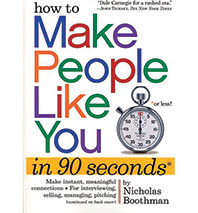
Toward a Greater Greet:
How to Make People Like You in 90 Seconds or Less By Nicholas Boothman
A guide to making a lasting good impression, from teeth to breath to handshake to small talk.
Lessons:
• After greeting someone, immediately clap your hands, then raise your handshake hand toward their heart.
• Take deep, lingering breaths when nervous. Imagine your nostrils are below your navel and the breaths are beginning from there.
• Find moments during a conversation to say “Me, too” or to otherwise establish common interests.
• The next time you’re talking to someone, synchronize your body language with the other person for 30 seconds.
• Practice saying the word great in the mirror using various inflections until you’ve made yourself laugh.

Make a Difference in Under a Minute:
59 Seconds: Change Your Life in Under a Minute By Richard Wiseman
Provides behavioral tweaks based on psychological research in an amount of time anyone can spare.
Lessons:
• During a date, bond over what you dislike.
• Let a smile slowly spread across your face and tilt your head toward the person you’re speaking to. It’ll make you appear more attractive.
• If you’re male, arrange to have a female friend accompany you on a night out to purposely laugh at your jokes.
• To be more creative at meetings, lean forward, grip the table, and pull against it. When your creativity is blocked, cross your arms.
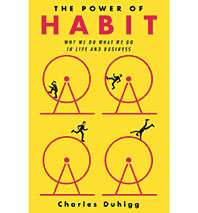
Forget About It:
The Power of Habit: Why We Do What We Do in Life and Business By Charles Duhigg
The secret of success may very well be mindless repetition.
Lessons:
• Make your bed every morning; other good habits may take hold.
• To start a new habit, pick a specific cue and a clear reward.
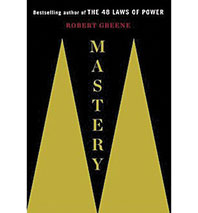
Do It the Hard Way:
Mastery By Robert Greene
Drawing on the lives and works of historical geniuses, Greene preaches nose-to-the-grindstone apprenticeship and mastery.
Lessons:
• Embrace tedium.
• Mastery is not genius; it is a function of concentration and time.
• Focus on five to ten years down the road, when benefits are truly reaped.
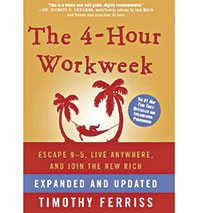
Succeed by Sitting Around in Your Underwear:
The 4-Hour Workweek By Timothy Ferriss
Self-help’s current version of “get rich quick.”
Lessons:
• To avoid wasting time, check e-mail twice a day: first at noon, and again at 4 p.m., the two busiest times for bingeing on e-mail.
• Instead of responding to voice-mail by phone, go through e-mail instead. This teaches you, and your contacts, to be concise.
• Eliminate reading magazines, newspapers, audiobooks, nonfiction books (except for his). TV is out of the question, as well as web surfing (unless it’s for work). And stop browsing Facebook.
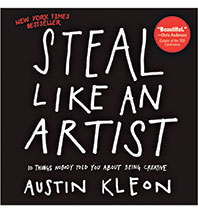
Copy to Create:
Steal Like an Artist By Austin Kleon
Originality is not all it’s cracked up to be.
Lessons:
• Start copying. Copy your favorite writer, musician, painter. You’ll get a better sense of how they think and create.
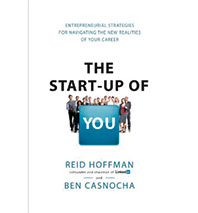
Be Your Own CEO:
The Start-Up of You By Reid Hoffman and Ben Casnocha
Live as if you were a tech start-up, by LinkedIn’s founder.
Lessons:
• Create an “interesting-people fund.” Use it to pay for coffee or lunches with people you find interesting.
• Who are the ten people you’d reach out to if you ever got laid off? Reach out to them now, when you don’t need anything from them.
• Set aside a full day to be a “yes day.” Say yes to everything all day.
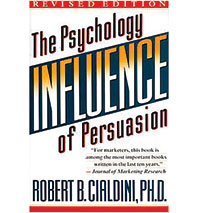
Perfect the Ask:
Influence: The Psychology of Persuasion By Robert B. Cialdini, Ph.D.
Business- and science-tested strategies for bending others to your will.
Lessons:
• Prepare the ground for making a request of someone by doing him a small favor.
• Ask for more than you want; once you’re turned down, ask for what you want.
• Before asking someone to give you something, ask them how they are feeling.

Get In Touch With Your Choices:
The Willpower Instinct: How Self-Control Works, Why It Matters, and What You Can Do to Get More of It By Kelly McGonigal, Ph.D.
Stanford professor McGonigal makes self-control a science.
Lessons:
• Exercise your willpower brain muscles by planting temptations throughout the house—hiding candy bars in plain sight, etc.—then don’t have them.
• Chart your willpower for a week. Then plan your schedule strategically and limit temptation when you know your willpower will be at a low.
• Imagine your future self by, for example, writing a letter to that future you.

Embrace Your Urges:
How to Think More About Sex By Alain de Botton
Getting clean about dirty.
Lessons:
• See bad dates the way you see bad weather. Natural parts of life that can’t be prevented or controlled.
• Reframe your view on impotence—not as a sign of inability, but instead as a sign of evolved compassion and kindness.
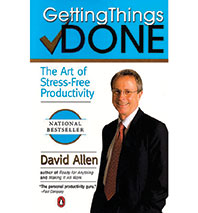
Program Your Life:
Getting Things Done: The Art of Stress-Free Productivity By David Allen
A cult leader with the mildness of a middle manager, Allen preaches a rigid system based on label-makers and manila folders.
Lessons:
• Create a collection bucket (notebook, in-basket, PDA) for all your input.
• Empty the buckets regularly by deciding what action each input needs.
• If the action takes less than two minutes, do it immediately.
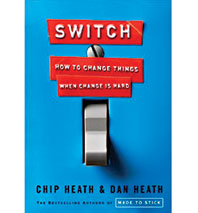
Help Your Better Half Win:
Switch: How to Change Things When Change Is Hard By Chip and Dan Heath
A new set of tactics in the endless struggle between our rational self and our emotional self.
Lessons:
• Come up with a black-and-white, all-or-nothing, absolutely essential goal.
• Define each “mistake” as a crucial part of the learning process, rather than an individual failure.

Worry Your Way to Inner Peace:
The Antidote: Happiness for People Who Can’t Stand Positive Thinking By Oliver Burkeman
Taking the low road to happiness.
Lessons:
• Focus on worst-case scenarios. (This reliably produces happiness, because the worst case usually doesn’t appear.)
• Goals that are too definite lead to cheating.
• Don’t wait for the perfect opportunity, just start taking action, using what you have, who you know, who you are.

Be the Prince:
The 48 Laws of Power By Robert Greene
Machiavelli for the modern mass market.
Lessons:
• If you need help, appeal to people from the angle of their own self-interest.
• Refrain from committing on contentious issues, so that you become a desired (and powerful) object.
• Be suspicious of free or cheap things, but use other people’s trustfulness of them to your advantage.
• Concentrate on one single outlet of power, so as not to dilute your strength.

Learn Not to Beat Yourself Up:
Choke: What the Secrets of the Brain Reveal About Getting It Right When You Have To By Sian Beilock
Understanding this most shameful phenomenon, for athletes and others, in order to prevent it.
Lessons:
• Before a challenging situation, like an important test, write down your worries about it.
• To avoid overthinking, try counting backward by threes or singing a song to yourself.
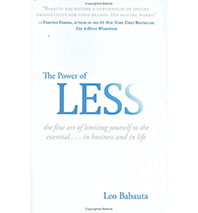
Simplify!
The Power of Less: The Fine Art of Limiting Yourself to the Essential … In Business and in Life By Leo Babauta
A minimalist, neo-Taoist Martha Stewart.
Lessons:
• Work on your most important task first thing in the morning.
• Block out time to clean your desk.
• Fully focus on the simplest of activities, like showering or eating; move on to more complicated tasks.
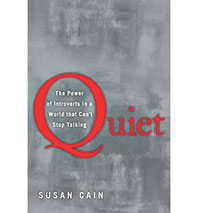
Learn to Live With Loud
Quiet: The Power of Introverts in a World That Can’t Stop Talking By Susan Cain
A feel-good book for the silent type.
Lessons:
• Look for “restorative niches”: time when you can escape from the tyranny of extroversion.
• Seating arrangements become crucial in an introvert’s livelihood. Opt for casual buffet-style dinner (instead of sitting around a large table). It’s a less imposing atmosphere.
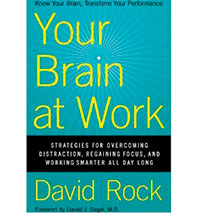
Readjust Your Thinking Cap:
Your Brain at Work: Strategies for Overcoming Distraction, Regaining Focus, and Working Smarter All Day Long By David Rock
The neuroscience of the working world, from creativity to collaboration.
Lessons:
• Practice setting expectations a little lower.
• Say this to yourself when feeling anxious: “That’s just my brain.”
• If you must multitask, toggle between active-thinking tasks and repetitive ones.
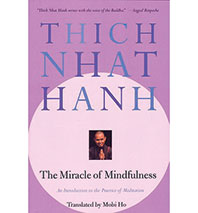
Pay Attention:
The Miracle of Mindfulness: An Introduction to the Practice of Meditation By Thich Nhat Hanh
A Buddhist chestnut on how meditation can change the world.
Lessons:
• When washing dishes, treat each of them as objects of contemplation and focus on the rhythm of your breath.
• Try to remain mindful for an entire day—as you bathe, do chores, even speak.
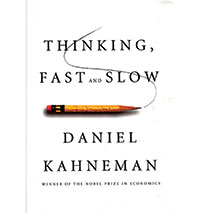
Let Your Mind Work:
Thinking, Fast and Slow By Daniel Kahneman
The War and Peace of the war between the impulsive, unconscious self and the reasoning self.
Lessons:
• Frowning will help you avoid the pitfalls that come with being overconfident.
• If you want to hire the best person for a job, establish six traits that represent the ideal candidate before the interviews start. Make your decision based on the candidate’s consistency with these traits, rather than your first impression.
• In order to lessen the emotional blow that comes with losing a gamble, repeat this mantra to yourself over and over again before gambling: “You win a few, you lose a few.”
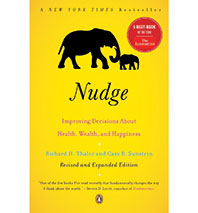
Make It Easy:
Nudge: Improving Decisions About Health, Wealth, and Happiness By Richard H. Thaler and Cass R. Sunstein
Building a better nanny state (“A spoonful of sugar makes the medicine go down”) by making people do what they should do because they want to.
Lessons:
• If someone is doing something in a way that is better than average, don’t point it out—if they realize they aren’t “normal,” they might adjust their behavior.
• People are paying less attention to you than you might think.
• Expect mistakes, and design a system of choices that works around them.
• When given fewer options, such as with funds in a 401(k) plan, we’re more prone to make a choice.

Make Them Want You:
The Art of Seduction By Robert Greene
From the beginning of time, getting over has been the basic human art—and Greene plucks the best advice from philosophers, playwrights, novelists, and others.
Lessons:
• Treat your reputation like a work of art—something that you have to carefully consider and craft.
• Be hard to figure out. Send mixed signals: both tough and tender, both spiritual and earthly, both innocent and cunning. A mix of qualities suggests depth.
• Don’t be too nice.Charming and kind can grow monotonous. Try inflicting some pain instead. Make your target feel guilty or insecure. The lower the lows, the higher the highs.
• If you make someone the star, he’ll grow addicted to you.
• Be hypnotic. Repeat words, especially ones with emotional content, like “taxes,” “liberals,” and “bigots.”

Make Fun of Your Problems:
The Happiness Trap: How to Stop Struggling and Start Living By Dr. Russ Harris
A psychiatrist advises to stop searching so hard for happiness—and you might find it.
Lessons:
• To lighten up, voice a negative thought with a goofy voice, preferably one from a cartoon character.
• Thank your own mind as a way of defusing negative thoughts—“Ah yes, the ‘I’m a failure’ story. Thanks, mind.”
• As a way of separating yourself from your thoughts, take ten deep breaths. Let any thoughts come and go in the background. Imagine that they’re passing cars.
• Practice acceptance of difficult moments or thoughts, but say things like: “I don’t like this feeling, but I have room for it” and “It’s unpleasant, but I can accept it.”

Reach Productivity Nirvana:
Lifehacker: The Guide to Working Smarter, Faster, and Better By Adam Pash and Gina Trapani
The would-be bible of the cubicle crowd aims to teach workers to become one with their computer.
Lessons:
• Devote the first hour of your workday to your single most important task.
• Identify time sinks and eliminate them.
• Practice efficiency with a timer for 60 minutes.
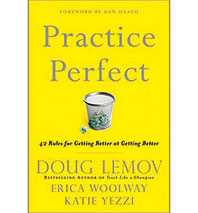
Repeat, Repeat, Repeat:
Practice Perfect: 42 Rules for Getting Better at Getting Better By Doug Lemov, Erica Woolway, and Katie Yezzi
The most important part of the game happens before the game even begins.
Lessons:
• Spend 80 percent of your time practicing 20 percent of the skills that are most important to you.
• Give skills a name and create your own vocabulary around it.
• Videotape yourself. Use it to capture real-life situations.
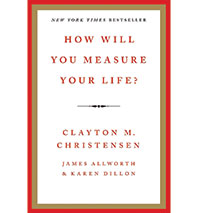
Run Your Life Like a Business:
How Will You Measure Your Life? By Clayton M. Christensen, James Allworth, and Karen Dillon
Quantify, apply balance-sheet principles, develop a theory of the case, and execute it.
Lessons:
• Make the investment in your family life early, long before the tensions from a lack of care and energy reveal themselves.
• Never give in to the impulse to go against your moral code “just this once.”
• In times of doubt, do it yourself. This will give you the confidence that you can solve your own problems and take pride in the results.

Get Right With Your Right Brain:
Thought Revolution: How to Unlock Your Inner Genius By William A. Donius
Could changing yourself really be as simple as writing with your weaker hand?
Lessons:
• Using your dominant hand, draw a picture that represents your response to the following: “This is my life now.” Then turn the page, take a breath, and draw your response using the other hand.

Lose the Crazy:
How to Stay Sane By Philippa Perry
How to win the war against neurosis.
Lessons:
• Occasionally ask yourself throughout the day, “What am I feeling now? What am I doing right now? How am I breathing?”
• Rephrase seemingly innocuous questions. Instead of asking, “Does anyone want coffee?,” say instead, “I want coffee, and I want you to come with me.”

Learn at Warp Speed:
The 4-Hour Chef: The Simple Path to Cooking Like a Pro, Learning Anything, and Living the Good Life By Timothy Ferriss
Cook your way to superfast expertise in any field.
Lessons:
• To hand-catch a pigeon, pin it against the ground, don’t grab it.
• When bear hunting in Alaska’s Chugach Mountains, aiming for the shoulders will increase the likelihood of hitting vitals like the heart.
• Fruit will make you fat.

Let the Universal Forces Be With You:
The Seven Spiritual Laws of Success: A Practical Guide to the Fulfillment of Your Dreams By Deepak Chopra
The surfing-hidden-currents approach to self-help.
Lessons:
• Maintain silence for a certain period of time every day—one to two hours is ideal.
• Meditate twice a day—30 minutes in the morning and 30 minutes in the evening.
• Let go of the need to convince others that you are right—use that energy to instead focus on more positive pursuits.

Take Your Time:
Wait: The Art and Science of Delay By Frank Partnoy
A scientifically buttressed paean to taking your time when speaking, deciding, dating, operating, investing, etc.
Lessons:
• Don’t apologize until you fully understand what you did wrong.
• If you don’t know what you are doing, do nothing at all.
Reported by Eric Benson, Angela Hu, and Emma Whitford.